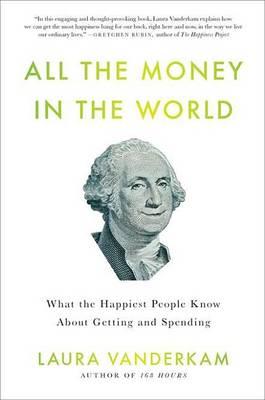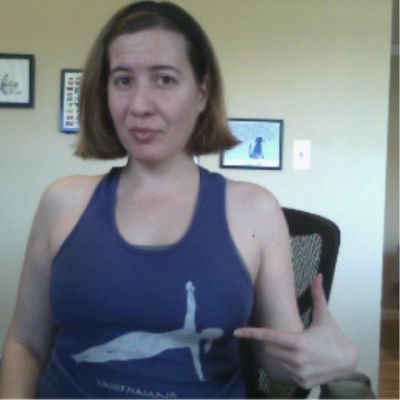Will the World Spin Off Its Axis If I Take Time Off?
4
Why Freelancing Is Like Juggling a Bunch of Flaming Chainsaws
29
Where the Magic Doesn’t Happen
29
Bedazzle It! All the Extras Your Query Letter Needs
19
How To Achieve Full-Time Success with Part-Time Hours
8
Create the Life You Want… Not the One You Think You Should Want
26
 Almost two weeks ago, I was on the phone with a reporter from a national magazine, talking about solopreneurship and personal branding. We were having a lovely chat — though I felt like a bit of a spaz; that’s why I’m a writer, you guys — when he asked me about my income.
Almost two weeks ago, I was on the phone with a reporter from a national magazine, talking about solopreneurship and personal branding. We were having a lovely chat — though I felt like a bit of a spaz; that’s why I’m a writer, you guys — when he asked me about my income.
“I make about $30k a year,” I told him.
“You can live on that!?” he asked.
I mentioned that I was lucky enough to have a husband who made way more money than me, so that I could create a life in which I only worked part-time hours. I told him I was building a career in which I could stay home with my future (as-yet-unconceived) children and not take a huge, unprepared-for blow to my paycheck. And if I needed more money, I said, I could always hustle a helluva lot more instead of sitting back and letting the work come to me (which is my current, lazy-ass m.o.).
He asked me what I’d do if a media company offered me a staff position at $75k.
“I’d turn it down,” I said. “No question.”
“What about $100k?” he asked.
“Nope,” I said. “I never want to give this up.”
Two days later, my bread-winning husband lost his job.
I had just arrived home from yoga when he called me. I was feeling loose, relaxed, happy. I didn’t realize who it was at first. Then: “I have bad news. I was just laid off.”
I told him everything would be just fine. After all, he had a ton of great contacts in the industry (he’s a web developer), plus this could give him the chance to focus on his own business (which, at the moment, he just does on the side). Then I hung up and started crying and, in a panic, spent the next three hours looking at job ads.
Pretty much everything I tell my clients not to do.
At that point, reason took hold and I reached out to my network. (Also, Michael eventually came home and told me to chill the eff out.) Within a week’s time, I had a new coaching client, a new ghostwriting project, two new, prospective ghostwriting clients, and yet another ghostwriting project on the horizon. And Michael had five trillion job interviews and his first job offer. (He’s lovable and stuff.)
I’ve been reading Danielle LaPorte’s The Fire Starter Sessions these past two weeks, and I felt a click when I read her chapter on money. In it, she writes:
Do you want to make a million bucks a year? Why? For what? Do you really need it to do what you want to do and be who you want to be this lifetime, or do you need more? How much will be enough if you’ve reached your lifestyle goals? And who really needs ‘more than enough’?
This passage reminded me of an exercise I’d done when reading The Wealthy Freelancer. Early on in the book, Pete Savage had asked readers to write up a description of their ideal day, so that they could then plan a means of getting closer to it.
What was weird was that I wasn’t as far off from my ideal day as one might think.
It also made me think of Laura Vanderkam’s All the Money in the World, in which she asserts that we already have all the money we need… but can easily get more if times get tight.
You guys! They’re totally right!
What I’m saying is… my response to that reporter still stands. Keep your $75k. Keep your $100k. I have all the money I need. And if I need more, I’ll just hustle harder. It’ll all work out in the end.
I don’t want to give up this life of mine. Because of the life I have, these past two weeks have allowed me to:
- sweat over the fact that my agent has started sending my book proposal around to publishers
- meet up with one of my tweeps at a networking event hosted by a fellow YEC member
- see the Bloggess in person, and have her sign my copy of her new book (better than all the great works of literature combined)
- have a Skype date with my writing partner
- bid on my dream house
- attend a meeting of the Toastmasters Club so I could improve my public speaking skills in advance of my panel at this weekend’s ASJA conference
- get a haircut in the middle of the day
- take 10 yoga classes
- work on masterminding a yoga/writing workshop with a fellow yogi
- hire a designer for a new web project
- work on several ghostwriting projects, and draw up a project proposal for another one
- apply for a volunteer position with Girls Write Now
- write a personal essay on infertility for YourTango
- have a phone chat with a new coaching client
- etc.
You guys. My life looked nothing like this when I was working full-time for someone else. Back then, I did the same type of work all the time, instead of mixing things up. I spent about three hours a day commuting. Instead of attending literary events and happy hours, I rushed home so I could eat dinner and get to sleep at a normal hour. I never worked out (and, as a result, quickly gained about 30 pounds). I was sick all the time, and also taking several medications for depression and anxiety. It most definitely was not my ideal life.
This life? The one I’m leading now? It’s a lot closer.
There are people who will look at my salary and think I’m not successful because I’m not pulling in six figures, or who will think I’m lazy because I’m no longer working crazy hours at the expense of my health.
But damn if I don’t feel successful.
So what’s your version of an ideal day? Are you making enough to achieve it?
Why You Should Change Your Definition of Success
13
 I started freelancing full-time almost five years ago. At the time, success meant matching my previous income, and saying yes to every project that came my way. As a result, I found myself working nights and weekends, skipping meals, and pushing exercise to the very bottom of my to-do list, where it never got done.
I started freelancing full-time almost five years ago. At the time, success meant matching my previous income, and saying yes to every project that came my way. As a result, I found myself working nights and weekends, skipping meals, and pushing exercise to the very bottom of my to-do list, where it never got done.
These days, success means being pickier about projects, preparing home-cooked meals with my husband, and having time for both my personal book project and my daily yoga classes. I have the potential to make more money… but the other stuff comes first.
Which is why I love Laura Vanderkam‘s work. In both 168 Hours and her most recent book, All the Money in the World, she shows readers that they don’t necessarily need more time or money to achieve a successful and fulfilling life. They just need to know how to spend what they already have.
In this Q+A, Laura shows us how we should redefine success.
1. I went on a sort of Laura Vanderkam reading marathon last week. What I noticed immediately about both your books is that they eschew the typical self-help trope of promising more (more money, more time) to the reader. Rather, you stress in both books that, generally, we have enough. We just need to learn how to spend both our time and our money more wisely, rather than cutting back on things we enjoy as a means of grabbing 15 minutes here, $100 there. How did you come to this somewhat contrary conclusion?
I highly recommend Laura Vanderkam reading marathons. I’ve got some novels stuffed in a drawer that you can read as well…
To answer your question, with time that insight came from looking at successful people. I’m talking about people who have big careers and big personal lives. These people have the exact same amount of time as the rest of us, so what are they doing differently?
In some cases, these people do have more money, but plenty of people with money somehow manage to spend it on things that make their lives more complicated, rather than less. If you start with a blank slate, rather than various assumptions about how we should be spending our time and money, you’ll soon see that 168 hours a week and an average American income can cover quite a bit. I mean, who cares about spending 10 minutes less on errands if you’re in the wrong job? Then you’re wasting 40 hours a week. Fix that first. Then you can be as inefficient on your errands as you want.
2. I loved 168 Hours. Who doesn’t wish for more time? But when I read the press release for All the Money in the World, I was intrigued, because it hinted at the possibility that you don’t necessarily need to be making more money in order to be considered successful. A prospect I find attractive, as someone who values work/life balance over ever-increasing income. Can you share with us your own, personal definition of success?
My goal is to be able to write about any topic I find interesting for publications I admire and in my own books (and on my blog), and know that my words will find a big audience. Money is part of success — it’s how the market often recognizes talent — but you have to consider it within categories. You can be among the world’s best poets and still earn less than a mediocre investment banker.
3. When did you reach that aha moment where you realized that success didn’t have to mean more money? Was there a specific instance where you had to choose between saying yes to a project or yes to yourself?
In 168 Hours, I write of giving up a fairly well-paying gig with Reader’s Digest. I wrote the Only in America section for years. It was a fabulous way to learn to write tight, and to learn about an incredible diversity of subjects, from a young man who walked every street in Manhattan to the person who holds the world record for the most Guinness World Records. I’m so grateful that they gave me the chance to do that.
But what I eventually realized is that I wanted to be focusing on books and longer, bylined articles, and the mental energy required to write six to eight well-reported short pieces every month was distracting me from that goal. It was a tough gig to walk away from financially, but since my husband gets a steady paycheck, we decided I could take some risks.
4. Even though you suggest that we have enough money/time if we spend it correctly, you do recommend simply making more money rather than cutting back on expenses as a way to improve quality of life. Can you share a specific instance in which you realized you needed an income boost (whether for everyday life or a specific purchase) and hustled like hell to get that extra cash? What tactics did you use to drum up that extra money?
My first year out of college, I had an internship at USA Today. My take-home pay was about $1,200 a month. That was enough to live on, but it wasn’t enough to save for bigger goals, like travel or moving to New York City (something I’d always wanted to do). So I freelanced for a variety of different publications. When you set your expenses based on $1,200 a month, even bringing in an extra $500 is a huge win. And by the end of the year I was bringing in a lot more than that — sometimes tripling my salary. If you’re making $1,200 a month, you can’t save $2,000 a month. If you’re making $4,000 a month, you can. I was able to spend three weeks traveling in Asia after the internship ended, and then have a few months’ cushion for moving to New York without a job lined up.
5. I’m a huge advocate of career diversification, something that freelancers tend to master early on. What does a typical mix of projects look like for you over the course of any given week?
Ideally I’m working on something very long term, like a book. I’ve got a few intermediate assignments: a feature for City Journal or another magazine, a USA Today column. Then there’s the immediate stuff: blogging three times a week for CBS MoneyWatch and keeping my own personal blog (www.lauravanderkam.com). Speeches have become a bigger component of my income over the past few years as well.
6. Finally, what was the most fun/fascinating/challenging project you ever did for the money?
I once ghostwrote a book in less than six weeks. I enjoyed the challenge. If I someday need to scale up my cash flow for big goals, I’d take on two to three crash jobs like that per year.
Related: Do You Love Your Work More Than You Love… Love?, Want Freelance Success? Watch Your Health, Didn’t Get It Done? That’s Your Own Damn Fault, Better Than Money
Freelancing and Yoga Go Together Like… Nutella and Pound Cake
6
Those of you who have been reading Freelancedom for awhile may have noticed a shift in tone recently.
Part of this has been due to a shift in focus, and in changing goals. Part of it has been due to the emotional/mental shift that comes with improved work/life balance, and with more consistent income (alleluia!).
But a big part of that shift has come from the fact that I now hit up my local yoga studio four to five days a week.
Is that crazy? Maybe. But I’ve come to realize that freelancing and yoga go together like Nutella and pound cake.
Let me explain. When I go to my morning and lunchtime yoga classes, I’m simultaneously pumped up for productivity and made more relaxed despite freelance-related stress. When I go to my evening class, focusing on the poses and meditating in savasana help me turn off my brain before bedtime. Yoga also helps me stretch out the muscles that perpetually ache after hours at the computer. And I’m healthier: mentally and physically. It’s been a long time since I’ve felt this good without the help of mood-stabilizing medication.
In fact, yoga has become such a big part of my life that I plan on entering a teacher training program in January 2013. Yoga won’t supplant writing and editing and coaching and singing, but it will become a big part of the mix.
But I know you came here to talk writing. And entrepreneurship. And the freelance life.
Still, I feel that there are a lot of writer-yogis out there, so I thought you might find this interesting.
Basically, to give the rest of you non-yogis a break, I’ve created a Tumblr on which I will now gush about everything yoga. It’s called OMmygod, and I think it’s OMazing (stop rolling your eyes).
Interesting, yoga-related links? Got it.
Fun, funny, and just-plain amazing yoga comics, photos, and videos? You bet.
A picture of me in headstand? Yes. I’ve allowed that to go out into the world.
Also, I’ve been kicking around the idea of planning a yoga/writing retreat for word nerds. Would any of you be interested in that? Let me know, and we can chat about making it the retreat you’ve been dreaming of.
Anyways. Yoga has changed my mindset, and I’ll continue bringing that new sensibility to my Freelancedom posts. I hope you don’t mind. But with this new outlet, I’m hoping I can keep things — dare I say it? — balanced.
How has your freelance focus shifted over the past few years?
Related: Inch By Inch: How Small Steps Lead to Big Success, You’re Doing Great. You Should Give Thanks and Chill the Eff Out., How Choosing the More Difficult Path Leads to Awesomeness (and a Cuter Butt)
Want Freelance Success? Watch Your Health
22
 At the beginning of June, I started ghostwriting an ebook with a very aggressive timeline. I didn’t take on many other projects during that time, aside from a blog post here and there, and some copyediting work. I also didn’t take breaks for lunch. I stopped going on my afternoon walks. My topless living room yoga sessions became far less regular. And I ate a lot of takeout Chinese.
At the beginning of June, I started ghostwriting an ebook with a very aggressive timeline. I didn’t take on many other projects during that time, aside from a blog post here and there, and some copyediting work. I also didn’t take breaks for lunch. I stopped going on my afternoon walks. My topless living room yoga sessions became far less regular. And I ate a lot of takeout Chinese.
Finishing that project (the last of the edits were completed in mid-August) was like coming up for air. It was freeing, but I also felt burnt out and unmotivated. I lost all momentum. For weeks, I did the bare minimum, telling myself I’d get back in the saddle after “that trip” or “that holiday weekend.” But I never did.
Then I started making yoga a bigger part of my life* and, suddenly, I was able to jump into new coaching work, start singing funerals again, and write a book proposal. Magic? Not quite.
Yesterday, I had a free wellness coaching session with Linda Formichelli. I had previously only known Linda as a freelance guru and writing coach, but I was intrigued when she announced the launch of HappyFit Coaching. To me, it made sense to see her expand her business to include health and wellness. Why? Because incorporating exercise and other positive health practices into your work day is about much more than achieving optimal work/life balance.
In chatting with Linda about my love affair with yoga, I admitted to her that, aside from making me feel stronger, more balanced, and more toned (you should check out my ass), yoga has also:
- helped me wake up in the morning, making the transition from sleep to work a lot less excruciating.
- given me a much-needed break in the middle of the day, allowing me to come back to the computer screen feeling refreshed and ready to kick some ass.
- stretched me out, which is great when you experience chronic back, neck, and shoulder pain from being hunched over your computer for the majority of your existence.
- quieted my mind, which is nice when you’re stressing the eff out over late-paying clients, scope creep, deadlines, and life in general.
- helped me get to sleep at night, which was previously impossible due to my inability to turn my brain off.
In short, being healthier made me a lot more productive.
Wouldn’t you like some of that?
Your own healthy habits don’t have to include yoga, but they should include activities that invigorate you, stretch you out, and give you an endorphin high. You should also eat nutritious meals (the pre-cooked chicken wings at the supermarket don’t count), so that you feel less horrifically sluggish, and you should make sleep a bigger priority. No more all-nighters, yo!
I’m not a health professional (which would be obvious if you ever secretly observed me), but I can point you toward some of the things that have inspired me to lead a healthier life. French Women Don’t Get Fat, for example, taught me a lot about mindful eating. And The Flex Diet – which isn’t actually a diet — provided me with lots of suggestions for eating healthier and enjoying my workouts.
And if you can’t afford a gym or studio membership, no worries. I rent belly dancing, hoop dancing, and yoga DVDs from Netflix all the damn time. Oh. And walking is free. (Don’t ask me to run, though. I don’t go above a power walk.)
Have you been giving your health short shrift? Do you think it may be negatively impacting your work? What one health-related change can you make to your day in order to boost productivity?
*Why yes, I AM obnoxiously obsessed with yoga lately. I”m sorry. You’re gong to have to deal with it. I’l try to mix up the yoga mentions with photos of my cats.
Related: How to Work from Home Without Losing Your Mind, Better Than Xanax
Looking for Fulfillment? Don’t Hold Out for Perfect
13
 For the past seven years, I’ve had a love affair with the self-help genre. I’ve devoured books like Only French Women Get Fat and The Flex Diet looking for solutions to my body hate. I’ve gobbled up books like Introvert Power looking for validation. I’ve read and re-read books like Naked, Drunk, and Writing and The Boss of You, chasing career success. I’ve turned to cliche classics like Don’t Sweat the Small Stuff in order to manage my mood.
For the past seven years, I’ve had a love affair with the self-help genre. I’ve devoured books like Only French Women Get Fat and The Flex Diet looking for solutions to my body hate. I’ve gobbled up books like Introvert Power looking for validation. I’ve read and re-read books like Naked, Drunk, and Writing and The Boss of You, chasing career success. I’ve turned to cliche classics like Don’t Sweat the Small Stuff in order to manage my mood.
There’s a lot of hate out there for self-help books, from people saying they provide false promises and lead readers to fruitlessly pursue perfection. And while I don’t look at these books as the answer to my everything, instead opting to apply what resonates with me and leave the rest, there’s definitely truth to the fact that people have a hard time being happy unless they feel they’ve achieved it all.
The other week, J. Maureen Henderson of Generation Meh wrote something on Salon that resonated with me. She described happiness as a jigsaw puzzle we could only lay claim to “once we’d carefully laid all of the pieces — careers, relationships, sense of self — into their rightful place.”
It was something that rang true.
My mood has been on a downswing lately, and I’ve spent an awful lot of time focusing on the worst parts of the past year and a half.
Our condo, for example. We put it on the market last summer, and have seen a pointed lack of interest since then. It’s frustrating to have half of our stuff in storage (making our condo look extra-spacious for the people who never come to see it). It’s frustrating to send my cats to live in my parents’ garage during open house season (to keep the condo clean, and to keep our association from finding out we have pets). I hate feeling so helpless, and I hate feeling unable to move forward.
Then there is the fact that I stopped taking all of my antidepressant and anti-anxiety medication two years ago, because I wanted to be chemical-free when I eventually got pregnant. The lack of success in that department hasn’t done much for my state of mind. Today, I’m calling a fertility center to schedule tests for both me and Michael so we can find out if there’s a problem, or if we’re just god-awful at babymaking sex.
And of course, Michael and I almost separated.
I know there are those who are (much) worse off than us. But knowing doesn’t always help. Because I want all the pieces. I want all the pieces of that puzzle in place.
The thing is, it doesn’t help to fixate on the things you can’t control.
The other week, I read Kripalu Yoga, and it listed five yamas (restraints) and five niyamas (observances) the Indian sages felt we should strive for. One niyama was santosha, or contentment. Contentment was defined as “joyfully accepting whatever life provides and not wanting more than is at hand.” I began to think of what I had at hand. What I could control, and what I was succeeding at.
I thought of my career.
According to an industry report recently released by the International Freelancers Academy, “the economy’s impact on freelancers has not been quite as severe as reported. The majority of freelancers (52%) either have not been impacted by the economy or have faced only a very minor impact.” Not only that, but 59 percent of freelancers feel more secure as a freelancer than they did working for someone else, and 39 percent are now earning more than they did as an employee in the same field.
For me, this is all true. Freelancing has given me more control than I’ve recently felt in any other aspect of my life. And while my definition of success may differ from yours, when I think of my career now, I feel successful.
Where can you create contentment in your life? Where can you find control?

